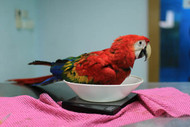Lessons Learnt From A Sick Bird
Posted by Sick Bird, ill Parrot, ill bird on 10/4/2025
Sophie explains the lessons learnt from a sick bird.
Having a sick bird is one of the hardest and most stressful aspects of living with Parrots. Our sweet Baby Olive the turquoise Green-cheeked Conure became unwell last year.
One evening we noticed her scratching at her face repeatedly, but after a minute or two she stopped, so the flock went to bed as normal. The next morning when we went in to wake them up, we noticed that Olive?s breathing was very laboured and her tail was bobbing with every breath.

Breathing
We could also hear her breathing which was exceptionally unusual. After giving her a full visual health check at home, we knew that she needed to visit our avian vet.
At the vets, she was checked over and observed. I even got to listen to her little heartbeat which was such a privilege. We showed the vet videos of her behaviour at home as everything is different in stressful situations.
It was concluded that Olive had some debris stuck in her syrinx which was a complete accident, as she has likely inhaled a piece of seed husk
She was very lucky as we had caught it early, so we went home with some medication, and she was back to her mischievous self within a week.

I?m sharing her story with you as whilst this situation was very worrying and stressful, it could?ve been much worse if we weren?t prepared in the event of an illness. It?s impossible to prepare for every scenario, but here are my top tips and lessons learnt from having a sick bird:
Weigh your bird regularly and keep a record of it.
This is useful to know both for if there is a drop in weight which could indicate illness, and so your vet can get the dose of any medications right.
Know the signs of a sick bird.
Parrots are prey animals and are notoriously good at hiding illness until they are very poorly.
Know what is normal for your bird as well.
Every Parrot is an individual, so understating their own quirks and behaviours can help you identify if something isn?t right.
Register your Parrot with an avian vet before you need to use their services and have their phone number saved in your contacts list.

Train your bird to voluntarily go in their ?travel carrier before you need to take them anywhere to make the trip to the vets less stressful.
Take videos and photos of any unusual behaviour or suspected symptoms so that you can show your vet ? sometimes Parrots will behave differently in unfamiliar places.
Put together a first aid kit before you need it. ?First aid kits are not a substitute for veterinary care, but they can help in an emergency.
We are so thankful that Baby Olive is happy and healthy again, and we that hope her experience can help you to prepare for any unexpected situations with your bird.

